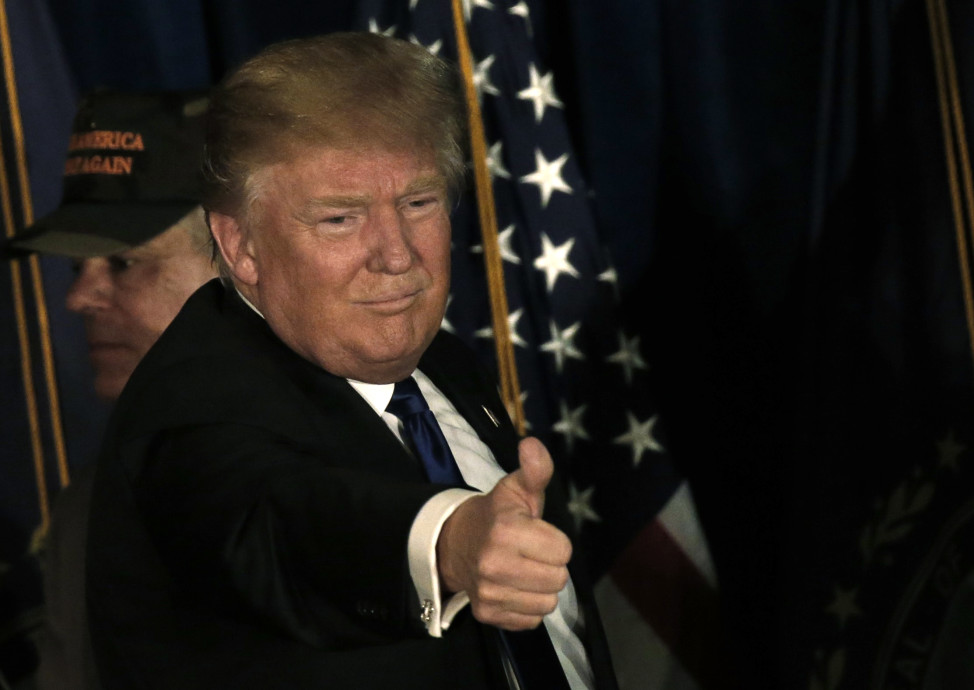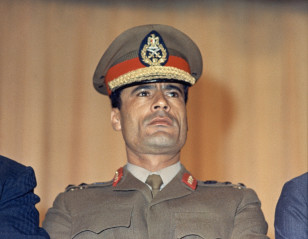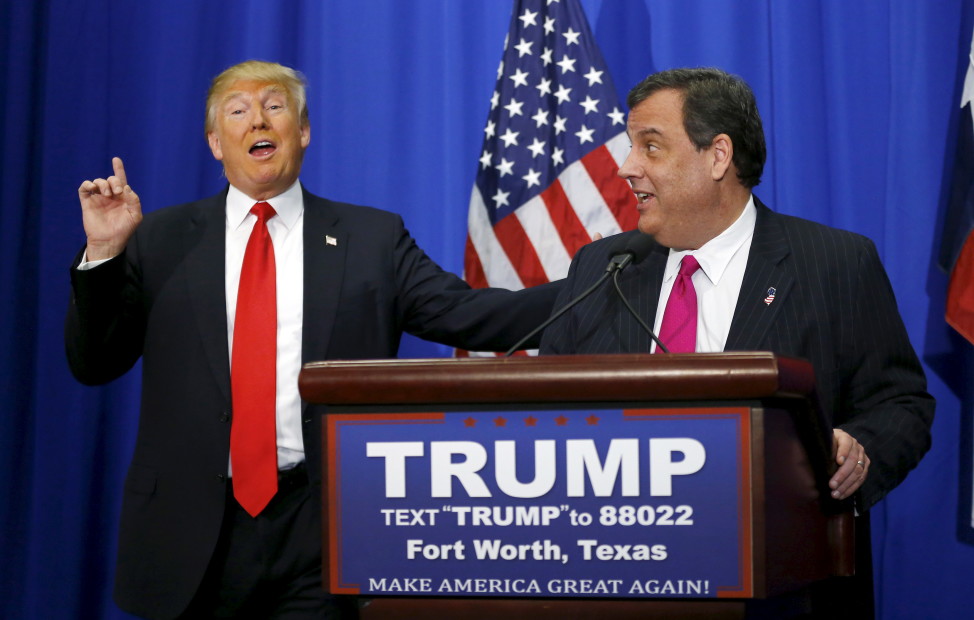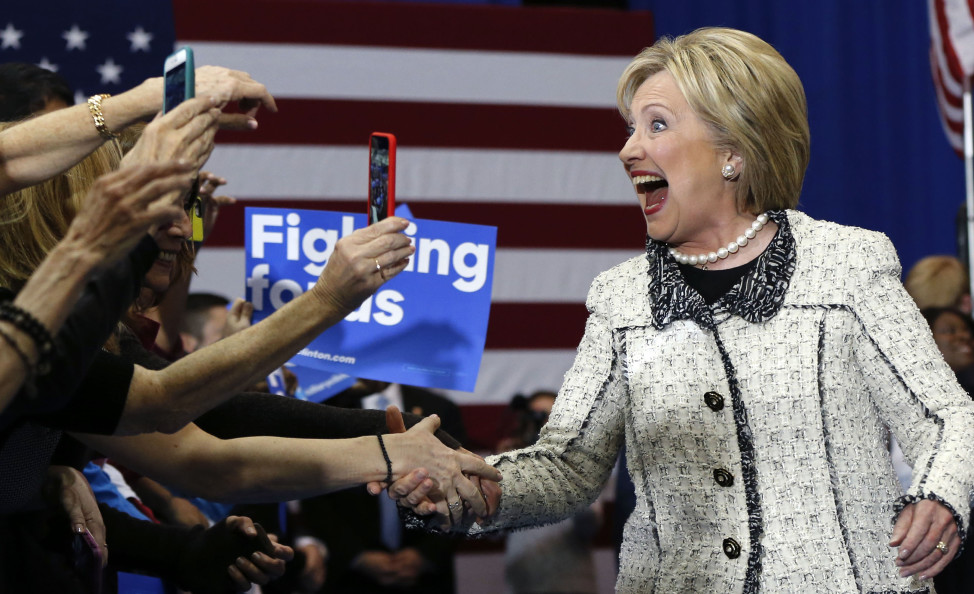Posted February 29th, 2016 at 1:23 pm (UTC-4)
By Barbara Slavin
The battle for the Republican presidential nomination this year has made many Americans squirm as they watch grown men fling potty-mouthed playground insults at each other in lieu of serious discourse.

Republican U.S. presidential candidate Donald Trump reacts at his 2016 New Hampshire presidential primary night rally in Manchester, New Hampshire Feb. 9, 2016. (Reuters)
Overseas, however, concerns are mounting at the prospect of a possible presidency by New York real estate magnate Donald Trump, whose foreign policy expertise appears to be shaky at best.
Over the course of the past few months, Trump, who is on track to win many Super Tuesday primaries tomorrow, has threatened to unleash trade wars against America’s top trading partners, with dire consequences for consumers, workers and global economic stability.
Trump also continues to insist that he will build a wall on the U.S.-Mexico border to keep out illegal immigrants and that Mexico will pay for it – something the current and last two presidents of Mexico have understandably rejected with scorn.

In this 1970 photo, Moammar Gaddafi is pictured at Cairo’s airport. (AP/file)
Trump has heaped praise on Russian leader Vladimir Putin, quoted Mussolini and said that the world would be better off with other ruthless dictators – Saddam Hussein of Iraq and Libya’s Moammar Qaddafi – still alive and in power.
Unable to name the three legs of the U.S. nuclear triad when questioned about that at a debate, Trump has nonetheless criticized the recently concluded nuclear deal with Iran and claimed he could have negotiated a much better one.
One of his complaints is that other countries will benefit from trade with Iran now that the United States has lifted most sanctions on that activity, but not on most U.S. commerce with Iran. That seems sensible —except that Trump would also lift the arms embargo against Iran.
Seemingly oblivious to the fact that the Obama administration still considers Iran an adversary and forbids arms sales to Tehran, Trump actually complained that the Iranians “just ordered missiles from Russia, nothing from the United States.”
Trump has also expressed views that have further damaged the image of the United States in the Muslim world and undermined the U.S.-led battle against the group that calls itself the Islamic State.
He has said that he would ban all Muslims from coming to America for an indefinite period and reject any refugees from Syria’s heart-breaking civil war, now entering its sixth year.
Trump has also said that he approves of waterboarding and “even worse” and would kill the families of suspected terrorists. If a President Donald Trump were to order such actions, military and intelligence professionals could rightly balk at such gross violations of United States and international law.
Reacting to this stream of uninformed consciousness passing as foreign policy, The Economist this week declared Trump “unfit to lead a great political party. Even if Trump in office repudiated his campaign comments, the magazine noted that “nobody has any idea” what the brash former television reality star would do “if faced with a crisis in the South China Sea, a terrorist attack in America or another financial meltdown.”
It is also unclear who a President Trump would name as a CIA director, secretary of state or secretary of defense. (New Jersey Gov. Chris Christie, the most prominent Republican to endorse Trump so far, appears to be aiming for attorney general.) If Trump has any foreign policy advisers, he has not identified them.

Republican presidential candidate Donald Trump (L) speaks next to New Jersey Governor Chris Christie (R) at a campaign rally where Christie endorsed Trump’s candidacy for president, in Fort Worth, Texas on Feb. 26, 2016. (Reuters)
Even in a Washington overflowing with ambitious foreign policy professionals, there has been no rush to join the Trump campaign.
A respected former CIA director, retired Gen. Michael Hayden, paused when asked recently if he could serve a potential President Trump. Hayden also told an interviewer, “I would be incredibly concerned if a President Trump governed in a way that was consistent with the way that candidate Trump expressed during the campaign.”
One consequence if Trump wins the Republican presidential nomination is that former Secretary of State Hillary Clinton, who is now on track to win the Democratic nomination, could attract significant support from Republican foreign policy hands.
A stream of advisers to former President George W. Bush has expressed consternation at Trump’s opinions about the world. The Weekly Standard, a harsh critic of President Barack Obama’s foreign policy, is running an article in its upcoming issue entitled “Selling America Short,” with the subtitle: “The country would cease to be great under a President Trump.”
With his harsh critique of Bush’s Iraq invasion, Trump does tap into support from those who think the United States should not intervene abroad except under the most extreme circumstances. Trump has spoken of building up the U.S. military but only in the hope that it would not have to be used. He has not clarified how he would go about dealing with ISIS apart from more bombing and targeting the relatives of ISIS recruits.

Democratic presidential candidate Hillary Clinton greets supporters after winning the South Carolina Democratic primary in Columbia, S.C., on Feb. 27, 2016. (AP)
If Clinton is the Democratic nominee, she will have some explaining of her own to do, particularly about her support for overthrowing Qaddafi and the chaos in Libya that has ensued. The New York Times has run quite thoughtful articles about her cheerleading on Libya and her failure to prod the Obama administration into doing more to prevent chaos in the aftermath of Qaddafi’s fall.
A President Clinton, however, would be a known commodity for most of the world’s leaders and foreign ministers. There would be no shortage of Washington-based foreign policy professionals vying to staff her administration.
Perhaps a President Trump would not turn out to be a disaster if he dropped many of his proposals and managed to hire competent aides. But at this point, there is little reason to be confident that he could smoothly steer the world’s remaining superpower through tumultuous times.





